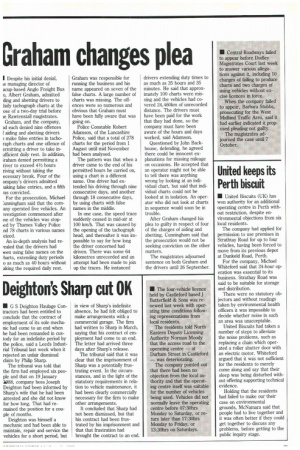Graham changes plea
Page 23

If you've noticed an error in this article please click here to report it so we can fix it.
I Despite his initial denial, e managing director of acup-based Anglo Freight Bus o, Albert Graham, admitted ding and abetting drivers to lsify tachograph charts at the ose of a two-day trial before ie Rawtenstall magistrates. Graham, and the company, ad each denied nine offences I aiding and abetting drivers ) make false entries in tachoraph charts and one offence of ermitting a driver to take inafficient daily rest. In addition, 'Frahm denied permitting a river to exceed 41/2 hours riving without taking the ecessary break. Four of the ompany's drivers admitted laking false entries, and a fifth tas convicted.
For the prosecution, Michael ;unningham said that the cornany operated five vehicles. An westigation commenced after one of the vehicles was stoped by Thames Valley Police nd 78 charts in various names eized.
An in-depth analysis had rerealed that the drivers had een using false names on the harts, extending duty periods o as much as 40 hours without aking the required daily rest. Graham was responsible for running the business and his name appeared on seven of the false charts. A large number of charts was missing. The offences were so numerous and obvious that Graham must have been fully aware that was going on.
Police Constable Robert Adamson, of the Lancashire Police, said that a total of 278 charts for the period from 1 August until mid November had been analysed.
The pattern was that when a driver came to the end of his permitted hours he carried on, using a chart in a different name. One driver had extended his driving through nine consecutive days, and another through 18 consecutive days, by using charts with false names in the middle.
In one case, the speed trace suddenly ceased in mid-air at 100 km/h. That was caused by the opening of the tachograph head, and thereafter it was impossible to say for how long the driver concerned had driven. There was some 64 kilometres unrecorded and an attempt had been made to join up the traces. He instanced drivers extending duty times to as much as 35 hours and 35 minutes. He said that approximately 100 charts were missing and the vehicles had covered 24,460Ian of unrecorded distance. The drivers must have been paid for the work that they had done, so the company must have been aware of the hours and days worked, said Adamson.
Questioned by John Backhouse, defending, he agreed there could be innocent explanations for missing mileage on occasions. He accepted that an operator might not be able to tell there was anything wrong by looking at an individual chart, but said that individual charts could not be Looked at in isolation. An operator who did not look at charts in sequence would soon be in trouble.
After Graham changed his plea to guilty in respect of four of the charges of aiding and abetting, Cunningham said that the prosecution would not be seeking conviction on the other matters.
The magistrates adjourned sentence on both Graham and the drivers until 26 September.














































